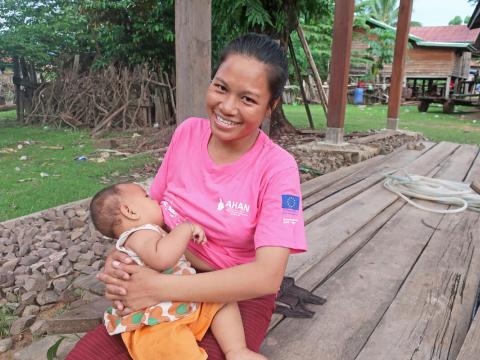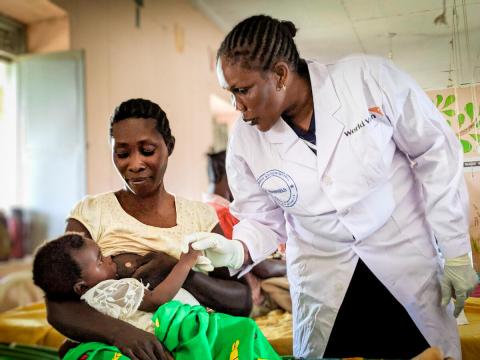
Breastfeeding can save 823,000 lives
Loria calls for all obstacles to protecting, promoting and supporting breastfeeding to be removed so babies get optimum nutrition from birth.
Loria Kulathungam, Knowledge Management and Capability Advisor, Health and Nutrition.
It was 2005, and I had just given birth to my first child, who I planned to breastfeed. When it was time to be discharged from the hospital, a nurse brought me a package of formula. I told her I didn’t need it or want it, but she insisted and continued to strongly insist despite my protests. In the end, I took it with me in order to end the conversation. I felt quite strongly about my decision to breastfeed, and when issues arose, I was able to get an appointment to visit a lactation consultant in those first few days, get the support I needed, enabling me to reach my breastfeeding goals. But I do remember wondering if I was doing everything correctly, and thinking about how easy it would be to just open up the free formula pack.
Partially because of this experience, I later trained and volunteered with my local Breastfeeding Companions peer-counselling program, and provided breastfeeding support via telephone to a number of new moms. I understand the sensitivity surrounding infant feeding – and I am fortunate to live in Canada, where policies and systems, such as an extended maternity leave, are conducive to breastfeeding. I know that in many countries, paid maternity leave is not a reality and accessing a lactation counsellor is nearly impossible.
Breastfeeding is the single most effective intervention to save children’s lives – 823,000 child deaths could be prevented each year by scaling up breastfeeding globally. Yet breastfeeding rates are still too low. Less than half of newborns are put to the breast within the first hour of life, and only 44 per cent of infants under six months are exclusively breastfed. Lack of support for mothers as they start breastfeeding is one of the key reasons for these low numbers. In addition, unethical marketing and promotion of formula milk is a major barrier to improving breastfeeding rates globally, making it almost impossible for new mothers to make an informed and unbiased choice about feeding their children. The World Health Organization’s International Code of Marketing of Breast-milk Substitutes (the Code) protects the health and development of all infants by ensuring each mother can make the best choice for herself and her baby, without influence from infant formula company advertising. Research shows that violations of the Code result in lower breastfeeding initiation and duration rates.
World Vision protects, promotes and supports exclusive breastfeeding from birth through six months of age, and continued breastfeeding, with appropriate complementary feeding until two years of age and beyond, as per WHO/UNICEF infant feeding recommendations. World Vision works with governments, community partners and caregivers to empower parents to make informed infant feeding choices. We train Community Health Workers (CHWs), including peer educators and Care Group volunteers to provide infant and young child feeding (IYCF) counselling. We also work with fathers and grandmothers to achieve social behavioural change around IYCF, and we advocate for infant and young child nutrition, including exclusive breastfeeding. World Vision in Cambodia and the Philippines, for example, are partnering to implement innovative systems for monitoring and reporting violations against the Code. World Vision’s commitment during the Nutrition Year of Action includes leveraging the Nine SMART Breastfeeding Pledges call to action we developed with Global Breastfeeding Collective partners.
It is essential that all obstacles are removed to protect, promote and support breastfeeding, and that skilled breastfeeding support is made available for all families everywhere. As with my experience, providing a woman who has committed to breastfeeding with a pack of free formula “just in case,” is not only unhelpful, it undermines her confidence in her ability to provide for her baby. National governments need to enforce the Code through legislation, empowering families to make infant feeding decisions that are free from commercial influence.
****
Loria Kulathungam is World Vision's Knowledge Management and Capability Advisor, Health and Nutrition. She has two decades of experience working in the Nutrition and Health sector and is a certified Knowledge Management Expert, who facilitates a Community of Practice of over 1600 participants working to promote a knowledge-sharing culture to contribute to learning and change. She is passionate about World Vision’s work to protect, promote and support breastfeeding and optimal infant and young child feeding. She volunteered with a local telephone-based peer-counselling program, Breastfeeding Companions, and participated in the equivalent of the WHO/UNICEF 20-hour Lactation Management Course. Loria represents World Vision on the Global Breastfeeding Collective. Follow her on Twitter @LoriaKula
